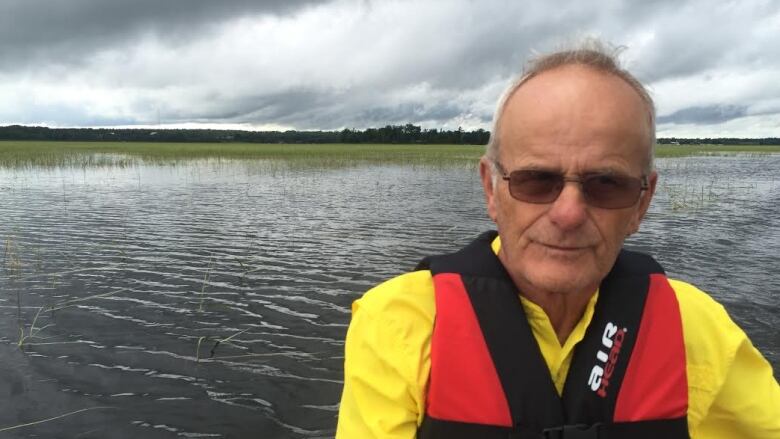Property owners, First Nations square off over rice farming in Ontario lake
James Whetung harvests the rice and sells it for $12 a pound

There's a battle brewing between property owners on a lake in Ontario's Kawartha region and a First Nations group using the lake bed to seed and harvest rice.
At the centre of the dispute is Pigeon Lake, located north of Peterborough near Bobcaygeon.
Larry Wood, whose family has lived on the lake for more than 70 years, told CBC News the problem began about six years ago when a local man began seeding rice in the lake.
Wood, who says he is joined by more than 200 families opposed to the planting of rice on Pigeon Lake, says the rice has now spread from "shore to shore" choking out other plants and hindering recreational uses of the lake.
"If this is allowed to continue, Pigeon Lake as we know it will no longer exist," Wood told CBC News.
Wood is careful to point out that wild rice has grown in the lake for decades; a small patch has flourished near his property for as long as he can remember. But what he and a group of property owners are opposed to is the seeding of rice plants in the lake. Images his group has posted on the 'Save Pigeon Lake' website show rice plants growing over a large area on the lake — from above, it looks like a farmer's field.
He said the rice farming benefits one business owner to the detriment of all other lake users.
"It definitely is a commercial enterprise," said Wood. "No person should have the right to create their own fields to raise their own crop to sell something commercially that he personally grew in public waters."

Rice grower unapologetic
James Whetung of the Curve Lake First Nation is unapologetic. He plants and harvests the rice, selling it for $12 a pound under the brand name Black Duck Wild Rice. He says that it feeds his community.
He sees the issue as one of aboriginal sovereignty and aboriginal peoples' right to access traditional foods.
"They hate me and what I'm doing. And they hate my people," said Whetung.
He says landowners accost him and call police when his family tries to harvest the rice.
"They don't want to see Indians getting rich and they use us for scapegoats for all their problems," he said.
Whetung says his people have gathered rice long before the cottagers came to the area.
"Why don't we kick them all off and take it all back," he said.
After spending three years lobbying various government bodies to prevent rice seeding on the lake, Wood said he and a group of neighbours were issued a permit by Parks Canada, which administers the Trent Severn Waterway, to "harvest aquatic weeds" from the lake at the end of July. A private company was hired to remove the rice from shoreline areas using a harvesting machine similar to a combine.
The weed harvesting was halted after a few days when a local First Nations group complained, arguing they weren't consulted about the removal of the rice, which is typically harvested in September.
"It's our right to harvest and gather so if any permits are given it should come through First Nations and not the Canadian government," said James Marsden, the chief of Alderville First Nation.
Parks Canada officials are planning to meet with First Nations groups next week to hear their side of the dispute and possibly reach a compromise.
Wood says property owners are "very upset" that the removal of planted rice was halted.
He said they're also frustrated by a lack of clarity about which government body has jurisdiction.
"When they bought their properties, none of this rice was here," said Wood.